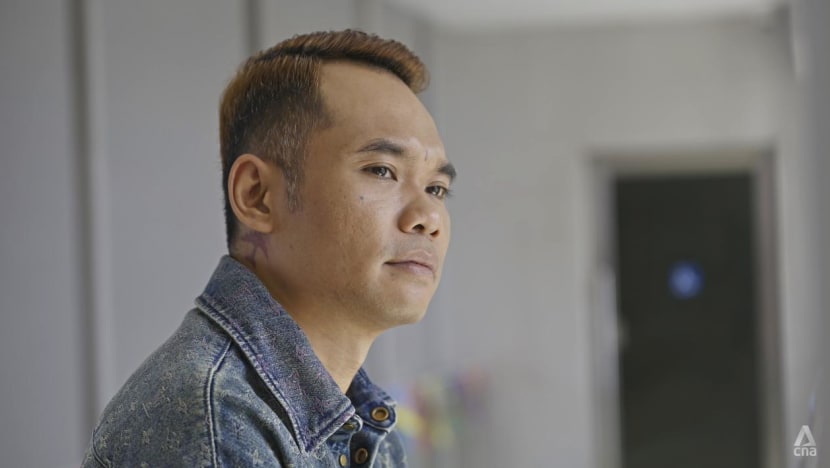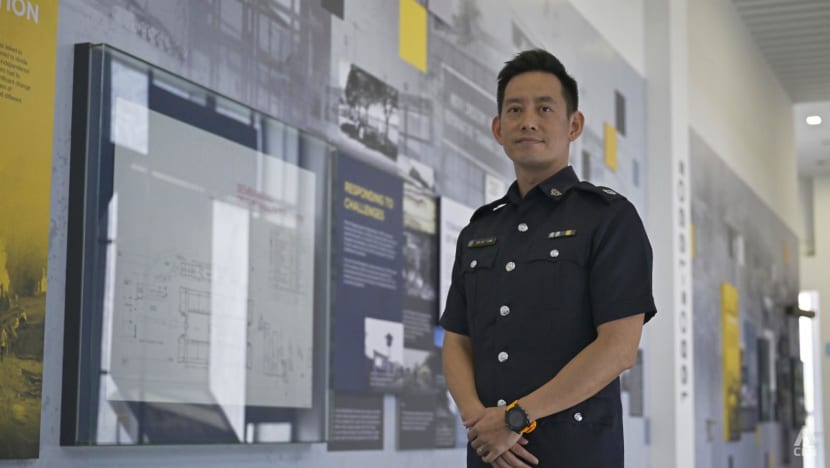'I proved them wrong': In and out of jail three times, this Singaporean is now working towards a master’s degree
Mohamad Fairizal Jaffar, 40, was an early beneficiary of the Yellow Ribbon Project, which marks its 20th anniversary this year.


This audio is generated by an AI tool.
SINGAPORE: Mohamad Fairizal Jaffar was jailed for the first time when he was 17, for taking drugs.
The 16-month incarceration "didn't have much impact" on the then-teenager, who continued on his self-professed wayward journey.
There would be two more terms in prison over the next 14 years. But amid the turbulence, he kept pursuing his studies and career aspirations, eventually earning a diploma and holding down a steady job as a logistics operations executive.
Financial help for Fairizal, now 40, came from the Yellow Ribbon Project, which will mark its 20th anniversary in October. The initiative aims to help ex-inmates reintegrate into society, with help from the wider community.
WHEN HIS "BEST WAS NOT ENOUGH"
As a Secondary One student in Bukit Panjang Government High School, Fairizal was the target of bullying by some older schoolmates.
“There were times when I came to school, and they were already outside of my classroom waiting for me," he said.
The fear of going to school every day led to him mixing with members of a gang in his neighbourhood. And they eventually went to his school to talk with the bullies.
“The upper sec boys shook hands with me and everything was settled from then on. I felt so great. That’s the power of having back-up,” said Fairizal.
Looking for a sense of belonging to the gang, he got his first tattoos when he was 15.

At age 21, Fairizal was jailed again, this time for five years and one month, for drug trafficking. He also received five strokes of the cane.
The prison lets inmates pursue education and Fairizal, whose highest qualification at that point was the Primary School Leaving Examination (PSLE), decided to further his studies while behind bars.
He managed to get "very good" grades for his O-Levels, which enabled him to go to polytechnic upon an early release in 2009.
Because he wasn't financially stable and also came from a low-income family, Fairizal turned to the Yellow Ribbon Project to fund his Marine and Offshore Technology diploma course at Ngee Ann Polytechnic.
“Yellow Ribbon actually funded me 100 per cent for my education,” he said.
Making it to polytechnic was an achievement for Fairizal, who always saw himself as not good at studies and without high hopes for how life might turn out.
At the time, Fairizal studied full-time in the day and took on night jobs, eventually becoming a bouncer at a club - which he said, in hindsight, was a bad decision.
"The environment in clubs (is) not that positive. So actually I could have gone to another industry, maybe hospitality for example,” he said.
Two years later, he was again locked up, this time under a law which allows the government to detain without trial people with links to criminal activity, especially gangs and secret societies.
He was found guilty on seven charges, including rioting with a deadly weapon and collecting protection money.
“I actually felt hopeless at that point of time, because I believe after the second incarceration, I actually gave my best, but that my best was not enough. All my efforts went down the drain,” said Fairizal.
This time, there was no foreseeable release date. Four years later, when he was finally told he was going to be let out, all he felt was a mix of joy and nerves.
“I didn't know whether I would be strong enough to overcome the challenges that would meet me outside."
"REALLY CANNOT SURVIVE OUTSIDE"
Upon release from his third - and last - prison stint, Fairizal didn't know which industry he wanted to enter, but knew he wanted a stable job.
He worked part-time as a dishwasher at Shangri-La Singapore, while looking for a full-time position.
A friend recommended him to a logistics firm, where he eventually started as a driver. The salary was low but it was an honest living, said Fairizal.
He has been with the company for nine years now, moving up the ranks to supervisor and now manager.
“Securing stable employment remains a hurdle for ex-offenders like Fai, because the social stigma of a criminal record often limits job opportunities, and can lead to discrimination by employers who are concerned about potential risks and negative perceptions of ex-offenders,” said Assistant Superintendent Soh Chi Yiong, team leader of the Singapore Prison Service’s Correctional Unit.
Early in ASP Soh's 21-year career, he asked a four-time repeat offender why he kept returning to prison.
“I was quite new, I was quite naive, so my genuine question was, ‘Do you enjoy prison so much that you like to come here so often? Is it because of the free food?’ I wanted to understand what was the reason that caused him to reoffend."
The response has stuck with him to this day.
The inmate told ASP Soh that while nobody wants to be in jail, he “really cannot survive outside”.
Whenever he looked for a job upon release, employers who found out about his criminal record never got back to him on his application. His family was also not supportive, as they no longer trusted him after his multiple prison stints.
With nobody to turn to for help, he returned to a life of crime for basic survival, ASP Soh recalled, though he also noted that Singapore’s recidivism rates remain one of the lowest internationally at about 20 per cent.

But ASP Soh said he's seen less of such inmates since the Yellow Ribbon Project started.
Instead, inmates have approached him to ask about classes and workshops for them to learn new skills and find jobs upon release.
The number of employers supporting the Yellow Ribbon Project by hiring ex-offenders has also increased from 1,381 in 2004 to 6,516 last year.
Fairizal told CNA that ex-offenders can overcome stigma - if given a chance.
“Take me, for example. I'm full of tattoos. Initially society had all these negative thoughts with regards to my appearance and my attitude, but I managed to prove them wrong,” he said.
STILL ON A JOURNEY
After receiving financial help in getting his diploma all those years ago, Fairizal now wants to pursue further studies, again with assistance from Yellow Ribbon.
The initiative has agreed to cover half his course fees for a graduate diploma in business administration.
"Up to today, they are still supporting me,” he said.
Fairizal is currently searching for the right school, with an eye on eventually getting a master’s degree.
Beyond his personal growth, he also gives back by conducting about four motivational talks every quarter, in schools and prisons.
He also keeps in touch with old friends and tries to motivate them to leave behind a life of drugs and gangs.
"I told them, ‘Believe me, once you achieve something like a good career and stable income, by then you will have the fear of getting yourself involved in trouble, because you will lose all of this’,” said Fairizal.
Some of them have found jobs with his help, and have become more conscious about staying out of trouble.
“If we go to a club, they will tell me, ‘Fai, if there’s any problem, I go back first. I don't want to be involved because tomorrow I have to work’,” he said.
“They know if anything happens to them, their job will be gone. They start to treasure the things that they have.”
Fairizal married in 2016 and has a seven-year-old daughter and a seven-month-old son.
He worries that his children might be subject to the same influences he encountered as a teenager. Still, he intends to give them the space to grow up without being overly controlling, as he feels that life is partly about learning from mistakes.
“At the same time, I will keep a close look out for them," he said. "Just to ensure that they don't go down the wrong path."
















